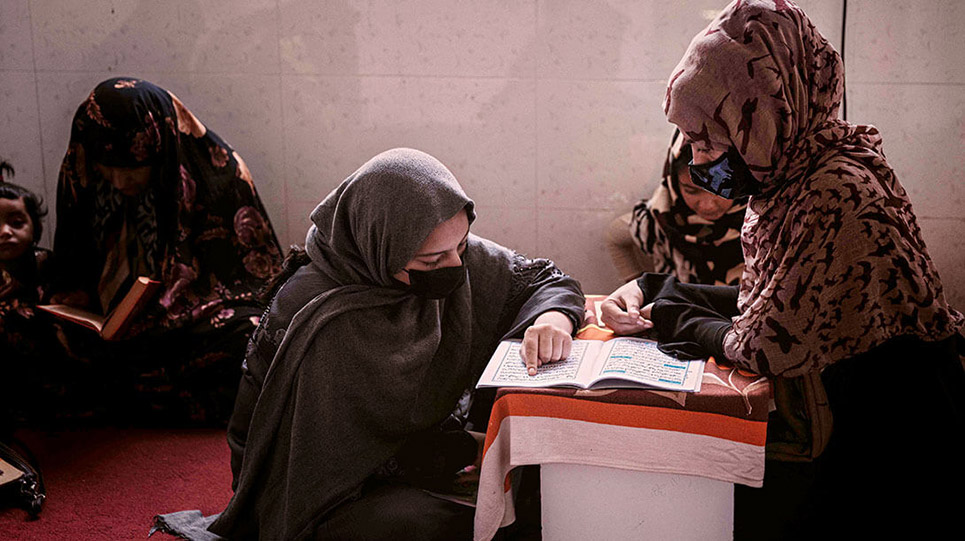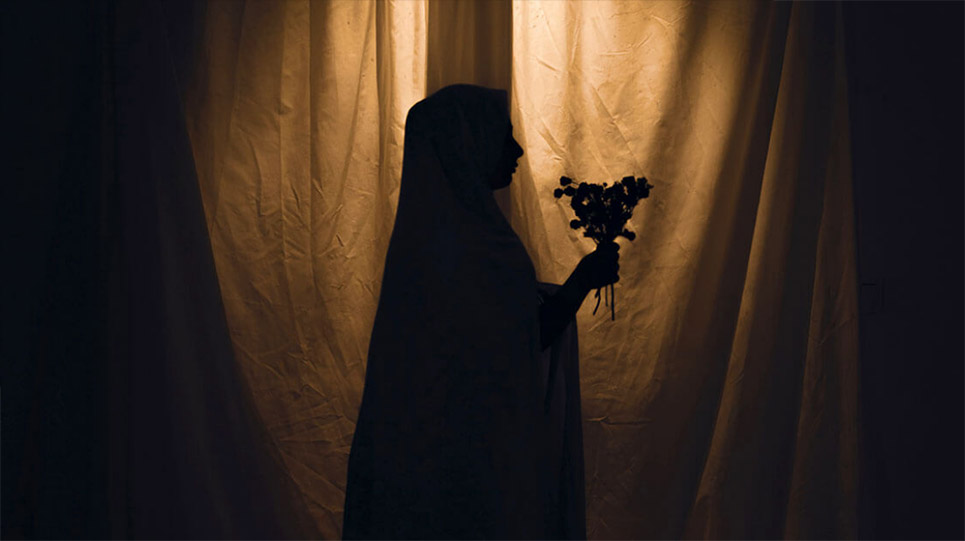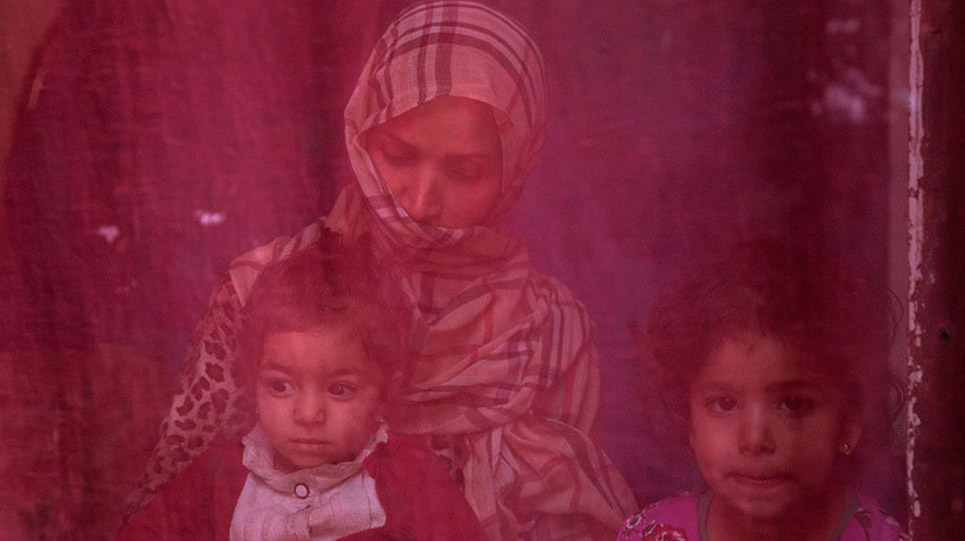Since August 2021, Afghan women and girls have been grappling with increasingly restrictive decrees limiting their participation in all aspects of social, economic, and political life. These have confined millions of women to their home, restricting their important contributions to society.
Their already dire situation has been compounded in recent months by humanitarian crises. First, devastating earthquakes rocked western Afghanistan in October 2023. Then, since November 2023, hundreds of thousands of Afghans have been forced to return after a Pakistani decree on undocumented migrants went into effect. According to International Organization for Migration (IOM) data, an estimated 80 per cent of those affected are women and children.
Photo essay: A glimpse into the lives of Afghan women

A young Afghan girl waits for her family to receive assistance at the Spin Boldak border crossing. Photo: IOM/Mohammad Osman Azizi.
To showcase the myriad struggles and resilience of Afghan women, UN Women and the IOM are organizing two joint photo exhibitions, at the United Nations Office in Geneva from 8 to 22 March and at United Nations Headquarters in New York from 11 to 22 March 2024, during the first week of the 68th session of the Commission on the Status of Women, an annual global meeting of Member States, gender equality champions, and experts.
This photo essay includes a selection of the anonymized photographs* and stories from this exhibition. The names and other details of women and girls featured have been changed for their protection.

Afghan families arrive from Pakistan with their belongings at the Spin Boldak border crossing in Kandahar. Photo: IOM/Mohammad Osman Azizi.
Many Afghans who left shortly after the Taliban takeover in August 2021 fled to neighbouring countries, such as Pakistan. In recent months, legal and economic conditions have made continuing to live abroad nearly impossible, forcing many to return to an unknown fate back home in Afghanistan.
Female-headed Afghan families face additional challenges.Habiba is one of them.

A 51-year-old Afghan woman who lost her husband in a suicide attack. She has no other family members and now lives with a neighbour. Photo: UN Women/Sayed Habib Bidell.
“I lived in Pakistan for two years”, says Habiba. “We faced lots of problems there. They would tell us, ‘We will drag Afghan immigrants out of Pakistan’, and that they wouldn’t let us stay. … Because we didn’t have any documents or visas, my children couldn’t go to school in Pakistan.
“We packed all our stuff, we prayed, and it was late at night when we left the house. Due to the rush of cars and people, we spent all night at the border. We spent a cold night, because we didn’t have enough warm clothing. Then, in the early morning, we started the drive back to Afghanistan. …
“We pray that my children wouldn’t starve and face any difficulties. We wish to have a better life here. … I ask the international community to stand with us and help Afghan people, especially returnees.”

Afghan returnees at a temporary shelter before heading to the IOM Transit Centre in Kandahar. Photo: IOM/Mohammad Osman Azizi.
Returnees must stay in temporary shelters before heading to the IOM Transit Centre, or their hometowns.Salma, a mother of six, recently returned from Pakistan.

This young Afghan woman was among the thousands who have been forced to leave Pakistan. Photo: IOM/Mina Nazari.
“One day, it all came crashing down around us”, says Salma. “The Government announced that they would be deporting all immigrants without proper documentation. We went there seeking a better life, and now we were being punished for it.
“I was filled with worry and anxiety as we packed up the few belongings we had and prepared to leave the only home our children had ever known. Where would we go? What would happen to us? Would we ever find a place to call home again? But even amid all this uncertainty, I knew that I had to stay strong for my children. They looked up to me, and I couldn’t let them see how scared and helpless I really felt. So, I put on a brave face, and told them that everything would be okay. …
“We left Pakistan with nothing more than the clothes on our backs and a suitcase full of dreams.”

Afghan returnees wait at the IOM Transit Centre in Kandahar to register for assistance. Photo: IOM/Mohammad Osman Azizi.
For many women who have not lived in Afghanistan for years, returning to a place where they have few rights and freedoms and cannot go out in public without a mahram (male escort) has been jarring.
As a counter-narrative to the Taliban’s campaign to render Afghan women invisible, UN Women created “After August”, a digital space to document and share the experiences of Afghan women.
Several of their stories and randomly paired photographs are featured in the exhibition. Among them is Belqis, who was forced to sell one of her daughters.

An Afghan mother holds her daughter, staring at the light from behind her obscured window. Photo: UN Women/Sayed Habib Bidell.
“After the Taliban takeover of the country last year, I had to sell my 6-year-old daughter for 100,000 afghani to pay off the expenses of the rest of the family”, says Belqis, a mother of three girls and six boys from Ghor. “I have to provide for the family. We don’t have tea at home. No soap. It is a bad situation.”

A 31-year-old woman sits by the window. She used to be an entrepreneur before the Taliban takeover. Photo: UN Women/Sayed Habib Bidell.
Before the Taliban takeover, Fatana was a student and vice-president of a youth union in Nuristan. She says she became a protester after watching the achievements of a lifetime disappear:
“I want to raise the voices of these innocent women to the international community, so that it no will longer just monitor and react, but act instead—act for the benefit of the brave women of my country, because we do not get anything from reaction! … My message to the world is to raise your voice with us, women, and don’t be silent. …
“Despite all the restrictions and torture, we women have not given up and we will not! … We have been projecting our voices more into the world, and we will continue on this path with our other sisters until the last moment of our lives.”

A 23-year-old graduate laments the erosion of her rights. Photo: UN Women/Sayed Habib Bidell.
As a defence lawyer, Joweria used to take on women’s and children’s rights, child marriage and domestic violence cases. Now, she can no longer practice law.
“Today, I am imprisoned in my own home simply for being a woman. Worse yet, I faced severe security threats that have forced me to leave my home. The place I lived for years, where I was respected by everyone, no longer had a place for me. … In the blink of an eye, I went from the throne to the ground, and the day came when I couldn’t even afford 10 afghanis for transportation.
“In secret, I’ve been providing educational opportunities from my home for several girls who are deprived of the right to go to school. … I’ve raised my voice many times to change the current situation. But it seems that here, ears are deaf, and eyes are blind. No one sees us, and no one hears our voices. Still, I know that, in the end, success will be ours.”

Women across Afghanistan now face multiple restrictions. This 24-year-old woman lost her father in an earthquake. Photo: UN Women/Sayed Habib Bidell.
Sohaila, a former parliamentary reporter from Takhar, is unemployed. Despite the restrictions, she’s started collecting and sharing stories about women online:
“Sleepless nights haunted me, and hearing the news of the dissolution of Parliament and closure of related offices shattered me. The Taliban stripped me and all Afghan girls of the spirit of change through knowledge and awareness.
“Most media outlets in Afghanistan do not hire female employees and journalists. Despite that, I was not discouraged and started collecting stories of women and presenting them through online platforms to ensure that the voices of Afghan women are heard and not stifled. This is the least I can do as a woman for other Afghan women.”

Girls and women across Afghanistan lack access to secondary education since the Taliban takeover. Photo: UN Women/Sayed Habib Bidell.
While most girls her age are in school in other countries, 15-year-old Negina is stuck at home in Bamyan:“I am making the most of my current captivity. … For the past six months, I’ve been teaching 12 neighbourhood children who, due to poverty or other reasons, couldn’t go to school. We hold daily one-hour classes in one of the rooms in our house. I’ve been teaching them subjects like math and Dari, and, fortunately, they can now read and write. … Although they’ve deprived me of my education, I have taught 12 other individuals, and this kind of fight against ignorance and illiteracy will be victorious, with time.”

Many Afghan women and girls are forced into unwanted marriages. Photo: UN Women/Sayed Habib Bidell.
Mahnaz, from Farah, is a former university student forced into marriage:“I cried out loud when I got engaged. I felt helpless and found myself in a situation where I had no say in my decisions. I was in my second year of university, studying law and political science, and I aspired to work in the judicial system to protect women’s rights in our country. Unfortunately, my dreams were shattered after the return of the Taliban.
“Many of my friends have faced similar fates, giving up their hopes and marrying against their will. For all girls who have been unable to complete their education, marriage is not a choice but a forced reality.”

Now unemployed, a woman sits at home with her two daughters. Photo: UN Women/Sayed Habib Bidell.
Women’s rights activist, author and poet Shabnam says her dreams may have been shattered, but not her will. “I didn’t accept defeat. I, alongside other courageous women, raised our voices to protest the injustices of the Taliban. We went to the streets to protest, despite all the challenges and lack of support, both domestically and internationally. The Taliban hadn’t expected such courage from women. It wasn’t until they realized that we posed a significant threat to their regime, that they attempted to suppress us. …
“[A] Taliban intelligence group raided my house in the middle of the night, and on that night, my [husband was beaten in front of my] two young children, and my other family members faced the worst possible treatment by the Taliban, leaving eternal trauma etched on their souls and minds. After that night, I had no way to return home, and I was in hiding in my own land, seeking my rights. … Despite all these difficulties, I won’t stop.”
These stories and images capture the hardships that so many Afghan women are experiencing, but they also bring hope in their remarkable strength and resilience, as they find their own unique ways to resist.
Note: None of the photographs featured here correspond to the stories or names mentioned, to protect the identities of the women and girls.



